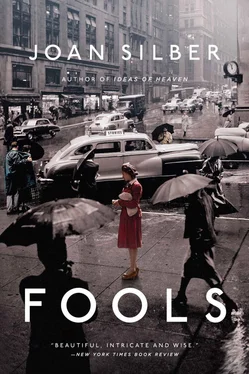That was the worst, his wanting you to agree. He always wanted that.
“I don’t know,” I said.
“Yes, you do,” Mr. Frances said.
I took my brushes to the sink to soak them in a jar of turpentine. “You do know,” he said.
I had the water running, and I kept my back to him. I didn’t want to look for another job. We had no savings.
“You do know,” Mr. Frances said.
The others had stopped talking. I wiped my hands on the towel. I should have turned around but I didn’t. The room was waiting.
“I know,” I said.
What if he fired me anyway? They were looking at me, the others, but they all would have done the same thing.
“Go home to your husband who has to put up with you,” Mr. Frances said.
I put on my jacket and got out of there. I thought about Joe the whole walk home. In my head I was explaining, trying to make myself sound better. Most of my days were not as bad as this one, but the sweetness and the one true thing at the end of all of them was Joe.
I didn’t stop to say anything to the others when I came in the door. I went down the hall at once to change out of the clothes that smelled of turpentine. I waited, sitting on the bed, and when Joe came in, tired and inky himself, he had to hear about my day.
“It’s not for profit that the man acts that way,” I said. “It’s to push someone around. He can’t resist. Do you think that’s a human instinct?”
“Of course,” Joe said. “But we overcome other instincts. We’re housebroken, we don’t go around mounting each other’s wives.”
I had to go in to work the next day too. Joe had his hand on my knee as we spoke. I leaned against him, against the hard span of his chest. “I’ve compromised too much, haven’t I?” I said. “It’s ugly.”
But I was as blithe as anyone when Betsy decided later that night that we should all go out to a speakeasy she liked. There I was, only hours after my unspeakable day, singing “Beautiful Dreamer” with her at the bar. She had a better voice than I did but I could keep on key after drinking. “Out on the sea,” I sang, “mermaids are chanting the wild lorelie.”
I secretly loved the song. Joe and Forster were talking nearby — Forster kept saying Goya was the best draftsman who ever lived. “No! Rembrandt!” I said. Gin makes you very certain about things. I didn’t want to fight with Forster or cross him. “I really like Rembrandt,” I said, more quietly and dumbly.
Dorothy said, “Nobody ever gets over those Goya war etchings. It’s Goya.”
“What about the leper?” I said. “What about what Rembrandt does with Christ healing the leper?”
“You people,” Betsy said, “have such grim ideas of beauty.”
“Beautiful dreamers,” Joe said. “What queens of song you are.”
“I bet you can sing,” Betsy said. “Can you sing?”
“Like a half-dead frog.”
“Frogs have outstanding voices,” Dorothy said. “As good as crickets.”
I thought they all liked Joe better than me. I liked Joe better than me. He was a better talker, more showy and funny, and also more uniformly nice. Now he was twanging a frog’s version of “Beautiful Dreamer” and then “Swanee River.” Did Dorothy fancy him? Probably not. She could sometimes flirt but she loved Forster.
“Some frogs can inflate their throats to the size of their heads,” Forster said.
“Only you would know that,” I said.
After Christmas, when the weather turned bitter cold, I was the one who ended up walking the dog when Richard didn’t want to bother going out, and I often ran into Forster in Washington Square. He had a favorite bench by the ginkgo trees on the south side. Like the dog, he liked to be outside.
“You’re not cold sitting there?” I said. Bakunin the dog was investigating Forster’s shoes. It was a Sunday morning and not very many humans were out.
“I don’t mind,” he said. “Dorothy says I just don’t notice.”
“In Tibet there are lamas who sit out naked in winter,” I said. “They slow themselves down, I think.”
“I’m afraid I’m not a lama,” he said.
“Fine with me,” I said. “I’m not disappointed.”
Forster smiled faintly at this. He was quieter than the others; you had to work to talk to him. “I’ve had enough clergy in my life,” I said.
“Dorothy has quite a religious side,” he said. “I have to say, it’s superstition to me.”
Bakunin barked at a squirrel, and I let him off the leash. He never caught any but it made him feel important to chase. We watched him leap at a sycamore, surprised each time that he couldn’t get up the tree by jumping. He consoled himself by sniffing at a man sleeping on a bench nearby. “Bakunin!” I said. “Don’t bother that person.”
The dog was whining. “No,” I said. “He’s not waking up to play with you.” A howling wail came out of the dog, a sound I had not heard him make before — a siren with a long quaver. Or was it the man howling? It wasn’t the man. He wasn’t moving. He was probably too cold to move.
“I’ll get Bakunin,” Forster said.
I went with him. The man on the bench had rolled himself in a filthy overcoat and pulled the top of it over his head. He was lying sideways on the bench, with his feet jutting off the edge — bare feet, grayed with dirt. What kind of city lets a man go shoeless in ten-degree weather? Even the cracked skin on the ankles looked like stone, not skin. Forster touched the man’s shoulder (very kindly, I thought) and said, “Sorry, sorry.”
I almost said, What an argument against alcohol! but it wasn’t a joke I wanted the man to hear. Anyone sleeping outside in winter was beyond desperate. Forster was bent over him, peering at whatever bit of the face showed from under the coat.
“Will you stay here,” Forster said, “while I try to find a policeman?”
“He’s not all right?” I said.
“No,” Forster said. “He can’t hurt you, don’t worry.”
I looked at the face myself. The helpless mouth, the empty eyes. When you grow up in the parish house of a church, you know what dead people look like. I gave a small, useless shriek, and then I said, “Go now.”
Once Forster was gone, I became alarmed that he hadn’t checked the man over more closely. What if the man was only sick and frozen, and there was something I should be doing? I started to rub his bare feet, to chafe them into warming. They were stiff under my gloves, but feet are always stiff. It was horrible to think I was bothering a dead man with my touch, but I kept it up. I thought of Dorothy, who’d trained as a nurse during the war and might’ve known what to do.
I said, “It’s all right, it’s all right,” to the body. The head had lank hair and a broken tooth showing from under the lip. I had to stay where Forster had left me, but I was afraid of the man as a corpse and afraid of him as a live human who might wake up dangerous. And then I was ashamed to be so interested in my own feelings when I was standing over a man at the border of life.
And the feet. I wouldn’t let the dog sniff them, I pushed his muzzle away. I knew perfectly well that they were Christ’s feet, even though I no longer took any of that literally. How could I not know? I was still chanting, “It’s all right,” and rubbing the shoeless feet, when Forster got there with a policeman.
“Please hold the dog, miss,” the cop said. Then he did all the things Forster and I should have done. He cupped his palm under the nostrils to feel for warm breath, he clasped the wrist where the pulse would be, he reached under the man’s shirt to find his heart.
“It’s bad?” Forster said.
“Bad as it gets,” he said. “You can go. Thank you. Thank you very much.”
Читать дальше












